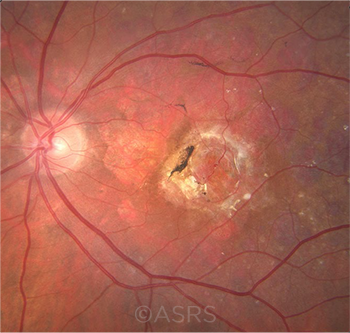Download PDF
Patients with age-related macular degeneration (AMD) should not worry that taking aspirin after a heart attack could increase their disease progression. That’s the conclusion of the 19th report culled from the two Age-Related Eye Disease Studies (AREDS).1
“We found that taking aspirin was not associated with an increased risk of developing AMD, either the wet or the dry form,” said Emily Y. Chew, MD, at the NEI.
The literature has been mixed on the association between aspirin, an established therapy for the secondary prevention of cardiovascular events, and the risk of progression to late AMD. However, Dr. Chew said the robust nature of the AREDS and AREDS2 data gives more credence to this study’s findings than any earlier conflicting cross-sectional and population-based studies. Among the strengths are long follow-up—10 years for AREDS and five for AREDS2—plus a sufficiently large sample size of persons with AMD.
This study’s statistical methodology attempts to level the playing field by matching the patients to focus on the effect of aspirin. In addition, two previous randomized trials also showed no increased risk of AMD progression with aspirin use.2,3
 |
PROGRESSION. The AREDS results indicate that aspirin does not affect progression of either dry or wet AMD (shown here). This image was originally published in the ASRS Retina Image Bank. Pamela Rowlett, CRA. Exudative Macular Degeneration. Retina Image Bank. 2019; Image Number 29991. © The American Society of Retina Specialists.
|
Caution: Not the last word. “The obvious limitation of our study is that it is not a clinical trial,” Dr. Chew said. “It is still an association study, so we cannot prove cause and effect.” For that, she is looking to ASPREE (Aspirin in Reducing Events in the Elderly), which set out to investigate whether the daily use of 100 mg of enteric-coated aspirin would prolong the healthy life span of older adults. Although the parent ASPREE trial concluded in January 2018, a five-year randomized substudy, ASPREE-AMD, will assess the effect of daily aspirin on the course of AMD in 5,000 subjects age 70 and older.
Until results from ASPREE-AMD are available, doctors may advise patients that aspirin is not likely to affect the progression of their AMD, Dr. Chew said. “We believe it is safe for patients who have AMD to take aspirin when indicated for other medical conditions.”
—Miriam Karmel
___________________________
1 Keenan TD et al. Ophthalmology. Published online June 26, 2019.
2 Christen WG et al. Arch Ophthalmol. 2001;119(8):1143-1149.
3 Christen WG et al. Ophthalmology. 2009;116(12):2386-2392.
___________________________
Relevant financial disclosures—Dr. Chew: None.
For full disclosures and the disclosure key, see below.
Full Financial Disclosures
Dr. Berkenstock None.
Dr. Chew None.
Dr. Masket Accutome: S; Alcon: C,L; CapsuLaser: C,O; Haag-Streit: C,P; Morcher: P; Ocular Science: C,O; Ocular Theraputix: C,O; PowerVision: C; VisionCare Ophthalmic Technologies: C.
Dr. Naidoo AstraZeneca/MedImmune: C,L,S; Bristol-Myers Squibb: C,L; Calithera: S; Kyowa Hakko Kirin: S; Merck: S; Takeda: C.
Dr. Rowan None.
Dr. Taylor None.
Disclosure Category
|
Code
|
Description
|
| Consultant/Advisor |
C |
Consultant fee, paid advisory boards, or fees for attending a meeting. |
| Employee |
E |
Employed by a commercial company. |
| Speakers bureau |
L |
Lecture fees or honoraria, travel fees or reimbursements when speaking at the invitation of a commercial company. |
| Equity owner |
O |
Equity ownership/stock options in publicly or privately traded firms, excluding mutual funds. |
| Patents/Royalty |
P |
Patents and/or royalties for intellectual property. |
| Grant support |
S |
Grant support or other financial support to the investigator from all sources, including research support from government agencies (e.g., NIH), foundations, device manufacturers, and/or pharmaceutical companies. |
|
More from this month’s News in Review